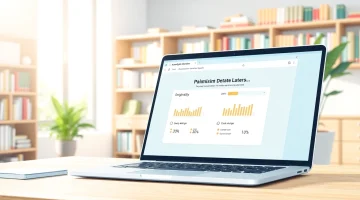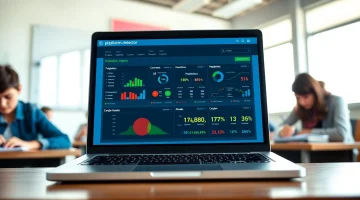
Elevate Your Skills with Insights from https://www.informaticsview.com
Understanding the Importance of Digital Information
In today’s fast-paced world, access to digital information is more critical than ever. As our lives become increasingly intertwined with technology, the ability to navigate and utilize online resources effectively greatly enhances both personal and professional development. Digital literacy is not merely a bonus skill but a necessity for thriving in the modern knowledge economy. At https://www.informaticsview.com, robust discussions around digital literacy highlight its integral role in shaping informed citizens capable of making sound decisions in various aspects of their lives.
Why Digital Literacy is Crucial
Digital literacy encompasses a range of skills including searching for information, evaluating sources for credibility, and understanding how to use digital tools to communicate and collaborate. A digitally literate individual can:
- Identify reliable sources of information amidst a sea of misinformation.
- Use digital devices efficiently for problem-solving and creativity.
- Participate actively in society by engaging in discussions with informed opinions.
Moreover, with the influx of data in our daily lives, digital literacy facilitates critical thinking, enabling individuals to discern facts from opinions, an essential proficiency in an era where misinformation spreads rapidly.
Common Challenges in Information Access
Despite the omnipresence of digital information, various hurdles impede access and comprehension. These challenges include:
- Lack of coherent digital skills, particularly among older populations.
- Information overload, where the abundance of content leads to confusion and difficulty in decision-making.
- Technological barriers, including access to devices and reliable internet connections.
Tackling these issues requires targeted initiatives aimed at promoting digital literacy, ensuring that everyone has the opportunity to engage with and benefit from available digital resources.
Effective Strategies for Navigating Online Resources
In light of the challenges encountered in information access, several strategies can significantly enhance the ability to navigate online resources effectively:
- Utilize Advanced Search Techniques: Being proficient in using search engines allows for more refined queries that filter out irrelevant content.
- Join Online Courses: Many educational platforms offer courses on digital literacy that can help improve your skills.
- Engage with Online Communities: Participating in forums and groups can provide support and insights from peers facing similar challenges.
By implementing these strategies, individuals can foster a more profound engagement with digital information, ultimately leading to personal and professional empowerment.
Innovative Approaches to Building Knowledge
Utilizing Online Platforms to Expand Your Expertise
Online platforms have revolutionized the way individuals acquire knowledge. Websites like Coursera, edX, and Khan Academy offer diverse courses across a myriad of subjects, often taught by industry leaders and professors from renowned institutions. Here’s how to maximize learning through these platforms:
- Identify Your Learning Style: Some individuals prefer visual learning through videos, while others may absorb information better through reading.
- Schedule Regular Learning Times: Treat online learning like a class by scheduling dedicated time for coursework.
- Engage in Discussions: Many platforms have discussion boards; actively participating enhances comprehension and retention.
Online platforms create a flexible and rich environment for gaining expertise, making it easier than ever to acquire new skills and knowledge.
Adopting a Lifelong Learning Mindset
A hallmark of successful individuals is a commitment to continuous learning. Embracing this mindset involves recognizing that education does not end with formal schooling. To foster lifelong learning:
- Embrace Curiosity: Cultivate a natural curiosity about the world and a desire to learn from every experience.
- Seek Feedback: Create opportunities for receiving constructive criticism, which can highlight areas for improvement.
- Reflect on Learning Experiences: Take time to evaluate what you’ve learned and how it can be applied in different contexts.
By adopting a lifelong learning approach, individuals position themselves to adapt to change and seize new opportunities as they arise.
Leveraging Community for Continuous Growth
Community plays a vital role in learning and personal development. Engaging with others allows for shared experiences and collaborative growth. Ways to leverage community include:
- Attend Workshops and Meetups: Participate in local events to connect with like-minded individuals and share knowledge.
- Form Study Groups: Collaborate with peers to discuss concepts and deepen understanding through conversation.
- Mentorship: Seek opportunities to learn from experienced professionals who can provide insights and guidance.
Communities foster a supportive learning environment, encouraging individuals to challenge themselves and grow.
Best Practices for Consuming Information
Identifying Credible Sources
In an age where anyone can publish information, discerning credible sources is vital. Here are strategies to evaluate sources effectively:
- Check the Author’s Credentials: Ensure that the author has expertise in the subject matter without biases.
- Look for Peer-Reviewed Articles: Articles published in academic journals are generally reliable and vetted by experts.
- Examine the Date of Publication: Timeliness is crucial; old information may not be relevant or accurate anymore.
These best practices equip you to sift through the vast amounts of information available and focus on those that add genuine value to your knowledge base.
Organizing Your Learning Materials Effectively
Effective organization of learning materials can enhance efficiency and retention. Consider these techniques:
- Utilize Digital Tools: Use apps like Evernote or Notion to keep notes and resources neatly organized.
- Create Summaries: After consuming information, summarize key points and insights to reinforce what you’ve learned.
- Set Up a Filing System: Develop a system for categorizing materials based on subjects, projects, or themes.
By organizing learning materials, individuals can easily access information and connect concepts, leading to a more effective learning process.
Implementing Note-Taking Techniques that Work
Effective note-taking is crucial for information retention. Here are several techniques that can enhance your note-taking process:
- The Cornell Method: Divide your notes into summaries, cues, and detailed sections to streamline review.
- Mind Mapping: Visual representations can help organize thoughts and show relationships between concepts.
- Bullet Journaling: Combine organization and creativity in a system that fits your personal style.
Experimenting with various note-taking techniques can lead to the discovery of a method that best suits your learning style, aiding information retention and recall.
Measuring Your Knowledge Progress
Setting Clear Educational Goals
Establishing specific, measurable, achievable, relevant, and time-bound (SMART) goals is foundational to tracking educational progress. Goals should challenge you while remaining attainable. To set effective goals:
- Define Clear Objectives: Identify what you want to learn and why.
- Break Down Goals: Divide larger goals into manageable tasks to maintain motivation.
- Regularly Review Progress: Set aside time to evaluate whether you’re on track to meet your goals.
By developing clear goals, individuals can better monitor their progress and make necessary adjustments to their learning strategies.
Tools for Tracking Your Learning Journey
Utilizing specific tools can streamline the process of tracking educational progress. Some useful platforms and strategies include:
- Learning Management Systems (LMS): Platforms like Moodle or Canvas allow users to track their course progress and assignments.
- Habit-Tracking Apps: Use applications such as Habitica or Coach.me to maintain momentum in achieving educational objectives.
- Reflection Journals: Keeping a learning journal can help in reflecting on what was learned and identifying areas for further exploration.
By employing these tools, individuals can achieve greater visibility into their learning patterns and successes.
Evaluating Skills Through Practical Application
One of the most effective ways to measure knowledge retention and skill acquisition is through practical application. Consider the following methods:
- Projects and Case Studies: Undertake projects that allow you to apply theoretical concepts in real-world scenarios.
- Peer Teaching: Explaining concepts to others can reinforce your understanding and highlight areas needing improvement.
- Self-Assessment: Create quizzes or surveys to evaluate your understanding of topics.
Incorporating practical applications into your learning journey fosters deeper understanding and enhances retention of knowledge.
Future Trends in Information Studies
Emerging Technologies Shaping Learning
As we move forward, several emerging technologies are set to shape the future of learning:
- Artificial Intelligence: AI can personalize learning experiences, tailoring resources and recommendations to individual needs.
- Virtual and Augmented Reality: These technologies enhance engagement and immersion in educational content.
- Blockchain for Credentialing: Secure and transparent credentialing systems will help learners authenticate their skills and knowledge.
By embracing these technologies, educational institutions can enhance learning experiences, making them more engaging and relevant.
Preparing for Changes in Digital Literacy Requirements
The digital landscape is ever-evolving, and as such, there will be changes to digital literacy requirements. Anticipating these changes entails:
- Staying Informed: Keep abreast of new digital tools and trends to remain relevant in the workforce.
- Developing Adaptability: Cultivating a flexible mindset allows individuals to transition smoothly into new technologies and workflows.
- Encouraging Educational Institutions to Innovate: Advocate for curricula that evolve with technological advancements.
Preparation for future changes in digital literacy not only empowers individuals but also enhances workplace competitiveness.
Promoting Inclusivity in Information Access
Inclusivity in information access is essential in ensuring equitable opportunities for all individuals. To promote this inclusivity, consider:
- Advocating for Policy Changes: Support initiatives aimed at increasing access to technology and the internet, especially in underserved communities.
- Creating Inclusive Content: Design materials that are accessible to all, regardless of their learning or physical capabilities.
- Providing Digital Literacy Training: Facilitate workshops focused on digital skills for diverse populations.
By championing inclusivity efforts, society can ensure that everyone has the opportunity to engage with and leverage digital information.



